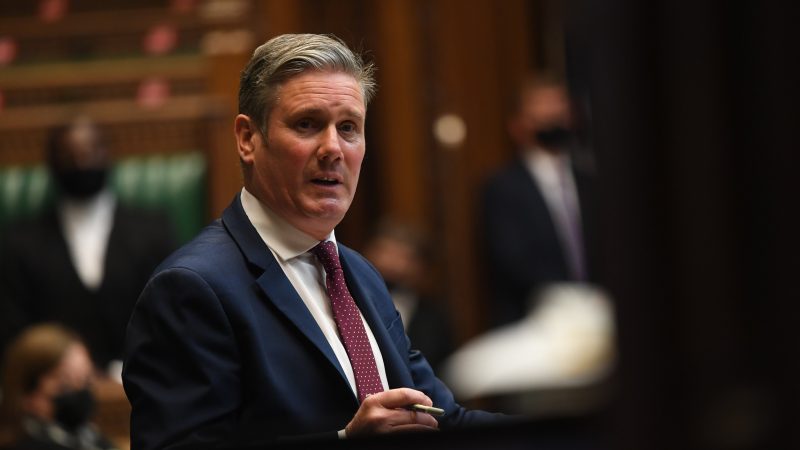
Nick Thomas-Symonds’s recent biography of Harold Wilson has a very telling sub-title: “The Winner.” Wilson won four elections and joins Clement Attlee and Tony Blair in a sparsely populated pantheon of post-war Labour winners. There are more and more signs that Keir Starmer might yet join them. Not being accustomed to victory, however, pessimism comes naturally in the Labour Party. The Conservative Party has an 80-seat majority. Starmer needs a swing greater than those achieved by any of Clement Attlee, Harold Wilson or Tony Blair to win outright.
That said, the betting markets are now suggesting for the first time that an overall Labour majority is more likely than a Conservative majority. In the financial markets, the chaos is telling us why this is happening. Sterling has fallen to its lowest ever level against the dollar after a mini-budget last Friday. Wilson’s devaluation in 1967 took the pound from $2.80 to $2.40, a fall of just under 15%. So far this year the pound has fallen 20%. Kwasi Kwarteng, despite being Chancellor of the Exchequer for less than three weeks, might just have made himself one of the notorious fall-guys of recent economic history.
The hapless Kwarteng, and his bizarre belief that people who earn over £155,000 a year will suddenly stimulate the economy if they are given a large tax cut, has rapidly made a tough inheritance for the new Prime Minister even worse. The rising cost of living, especially the inflation in energy prices, was always going to be difficult to deal with even before the Chancellor set out to create a low tax, deregulated society out of Tory dreams.
The historic weakness of the Labour Party has been its economic vulnerability but there is no reason to be spooked. The Truss and Kwarteng fiasco has not set a trap for Labour. Keir Starmer’s immediate response to the mini-budget was sure-footed – to welcome the cut in income tax on the lower paid but to come out against the move on the top rate. There was once a time when Labour was scared to put the top rate up for fear that it would seem like a tax on aspiration. In the current circumstances, the politics are very different.
The same is true on public spending. The Labour opposition of the late 1990s crafted a reputation for economic reliability, under the careful stewardship of Gordon Brown, by committing to stay within Tory spending plans. At the time fiscal conservatism was an established norm and Labour needed to prove its mettle. Now, after Covid and the Kwarteng bonanza, public spending is over 43% of national income and a high level of public spending is an established fact. The Tories have set the norm in a place where Labour can be comfortable. Labour can now accept the Tory limits because so much space has been opened up.
It sounds complacent to say so but Labour can do quite well by doing nothing. The truth is that nothing that happens in Liverpool will be as important as what happens in Downing Street. The Tories really are, finally, the shambles that Labour conference speakers have over the years denounced them for being. It has been said many times since Truss took over that she has no mandate for the sort of government she leads. That is true but the much more worrying thing (for her) is that she would not get a mandate if she sought it. There is no appetite for such a government in Britain as Truss will discover when she is forced to submit to the discipline of the electorate. At the time of writing, Labour has a 13-point lead (44% to 31%). 72% of voters express no confidence in Truss’s plans. These are the sorts of numbers from which it is very hard to come back.
Which is not to say that doing nothing is advisable. It is just about credible that the economy might be on a recovery path by the time of the next election. Greater clarity could, in any case, be the difference between winning a small majority and being the largest party in a hung parliament. The task for Labour this week is not to add more policy. Labour has enough policy already. It is to indicate the type of government it will be and inspire confidence in that fact. Rachel Reeves provided a good example when she allocated the receipts from reversing the 45p tax rate cut to the task of training more doctors and nurses. There is no necessary linkage between the two issues, it’s just clever politics to put them together.
The Conservatives have been in power too long. It’s time for change and when the public gets that sense it can be hard to turn around. Keir Starmer already rates more highly as a potential Prime Minister than Liz Truss. If Labour emerges from conference having given a flavour of what it would be like in government and looking and sounding more credible than the current incumbents it will have been a good week. It’s a modest ambition but it could prove a winner.




More from LabourList
‘Council Tax shouldn’t punish those who have the least or those we owe the most’
Two-thirds of Labour members say government has made too many policy U-turns, poll reveals
‘Two states, one future: five steps on the path to peace for Israelis and Palestinians’